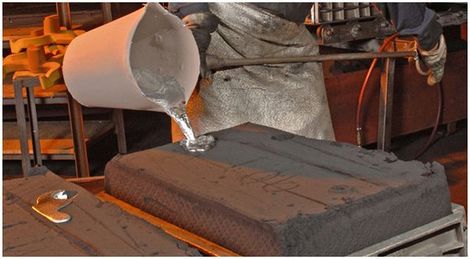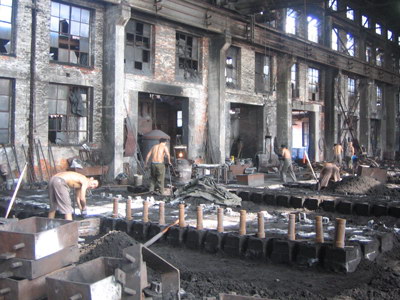How robotics and digital tools are improving the Aluminum Foundry process
Checking out the Duty of a Metal Foundry in Modern Production Processes
Metal foundries are crucial in the landscape of contemporary production. They provide essential parts across different sectors, adapting to the needs of industries such as vehicle and aerospace. Advanced strategies such as 3D printing and automated casting have actually changed their operations. Furthermore, sustainability has actually come to be a priority, affecting their techniques. As these foundries develop, the effects for producing performance and advancement are considerable, raising inquiries about their future trajectory in an ever-changing economic climate.
The Development of Metal Casting Strategies

With the rise of automation, foundries embraced approaches like die casting and lost foam casting, enhancing the production procedure and lowering waste. Each evolution in metal casting strategies has provided to the requirements of numerous markets, from vehicle to aerospace. As metal casting proceeds to development, the interaction between method and technology stays crucial in conference contemporary production difficulties, making sure that foundries adjust and prosper in an ever-changing landscape.
Integration of Advanced Technologies in Foundries
Conventional metal casting methods have offered the sector well for centuries, the assimilation of innovative modern technologies in foundries is changing the manufacturing landscape. Automation and robotics simplify manufacturing procedures, improving effectiveness and decreasing the danger of human error. Technologies such as 3D printing permit quick prototyping and the development of complicated geometries that were when impossible with standard techniques. In addition, information analytics and the Internet of Points (IoT) enable real-time tracking and anticipating maintenance, inevitably causing decreased downtime and increased performance. These innovations likewise help with modification, permitting makers to respond rapidly to market demands. As sustainability becomes a priority, the fostering of eco-friendly technologies, such as electrical melting furnaces and advanced sand recovery systems, better shows the industry's dedication to technology. Jointly, these innovations not only improve operational performance yet additionally placement foundries at the forefront of modern manufacturing practices.
The Impact of Product Scientific Research on Foundry Operations
Material science plays a pivotal role in enhancing factory operations, affecting both the selection of materials and the overall casting procedure. Developments in material science supply a much deeper understanding of the residential or commercial properties of alloys and steels, enabling foundries to pick one of the most suitable materials for specific applications. This understanding improves the performance and durability of cast items, which is crucial for fulfilling market standards.
Moreover, technologies in product solutions and additives add to improved casting techniques, decreasing problems and enhancing production performance. The development of sophisticated metal compounds and clever materials allows foundries to produce lighter, more powerful elements, which are increasingly sought after in numerous markets such as vehicle and aerospace.
Additionally, product scientific research aids in the recycling of metals, making procedures a lot more affordable and efficient. By leveraging the most recent searchings for in material scientific research, foundries can adjust to advancing market needs, guaranteeing their competitiveness in a rapidly changing manufacturing landscape.
Sustainability Practices in Modern Metal Foundries
With the growing focus on ecological responsibility, modern metal foundries are significantly executing sustainability methods to reduce their eco-friendly impact (Metal Casting). One essential strategy includes the recycling of scrap metal, which not only reduces waste but likewise saves power and raw materials. Foundries are embracing innovative melting modern technologies that boost energy effectiveness, as recommended you read a result lowering greenhouse gas discharges. In addition, making use of eco friendly finishings and materials has actually gotten grip, more decreasing dangerous exhausts during production
Water conservation techniques, such as closed-loop cooling systems, are being carried out to lessen freshwater usage. Numerous foundries are likewise buying renewable resource sources, like solar and wind, to power their operations, thereby decreasing dependence on nonrenewable fuel sources. Personnel training programs focused on sustainability methods promote a society of environmental recognition within the labor force. These campaigns jointly add to a much more sustainable future for metal foundries while fulfilling the demands of eco-conscious customers.
The Future of Foundries in a Transforming Economic Landscape
As the worldwide economy advances, foundries deal with a myriad of challenges and opportunities that will certainly shape their future (Aluminum Foundry). The enhancing demand for lightweight materials and advanced alloys demands innovation in production techniques and technological combination. Automation and smart manufacturing methods are ending up being vital for improving performance and minimizing functional expenses. On top of that, the surge of sustainability concerns forces foundries to embrace greener procedures and recycling initiatives, lining up with worldwide ecological objectives
The economic landscape is additionally shifting, with supply chain disturbances and varying basic material rates offering considerable obstacles. Foundries must adapt by diversifying their supply resources and investing in materials science. Collaboration with industries such as renewable power and electric lorries can promote growth. Inevitably, the future of foundries will certainly rely on their capability to utilize technological innovations while staying responsive to market characteristics and environmental imperatives, guaranteeing their relevance in modern manufacturing.
Regularly Asked Questions
What Types of Metals Are Typically Utilized in Foundries Today?
Typically used metals in foundries today consist of light weight aluminum, iron, copper, zinc, and steel. These products are favored for their diverse residential or commercial properties, allowing a vast array of applications in markets such as automobile, aerospace, and construction.
Exactly how Does a Factory Make Sure Quality Assurance in Its Products?

What Precaution Are Carried Out in a Metal Foundry?
Metal foundries implement precaution including personal safety tools, air flow systems to lower inhalation of fumes, routine safety and security training for workers, emergency situation feedback methods, and extensive devices upkeep to reduce hazards and guarantee a risk-free working atmosphere.
For how long Does the Metal Casting Refine Generally Take?
The metal casting process commonly takes several hours to days, relying great post to read on variables such as the complexity of the mold and mildew, the type of metal used, and cooling weblink down times. Each task's demands greatly affect the period.
What Industries Primarily Depend On Metal Foundries for Production?
Automotive, machinery, aerospace, and construction markets mostly count on metal foundries for production. These markets utilize cast metals for parts, making sure toughness and performance necessary for their corresponding applications in production and setting up procedures.
Metal foundries are essential in the landscape of contemporary manufacturing. Metal Casting. Typical metal casting methods have actually served the industry well for centuries, the combination of sophisticated modern technologies in foundries is changing the production landscape. Breakthroughs in product science supply a much deeper understanding of the homes of metals and alloys, allowing foundries to pick the most appropriate products for specific applications. With the expanding emphasis on environmental responsibility, contemporary metal foundries are significantly carrying out sustainability techniques to decrease their eco-friendly footprint. Automotive, equipment, aerospace, and building and construction sectors mostly count on metal foundries for manufacturing